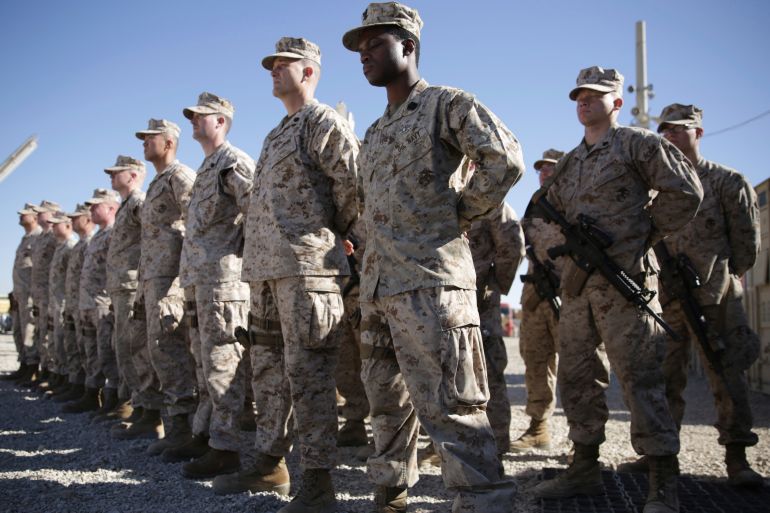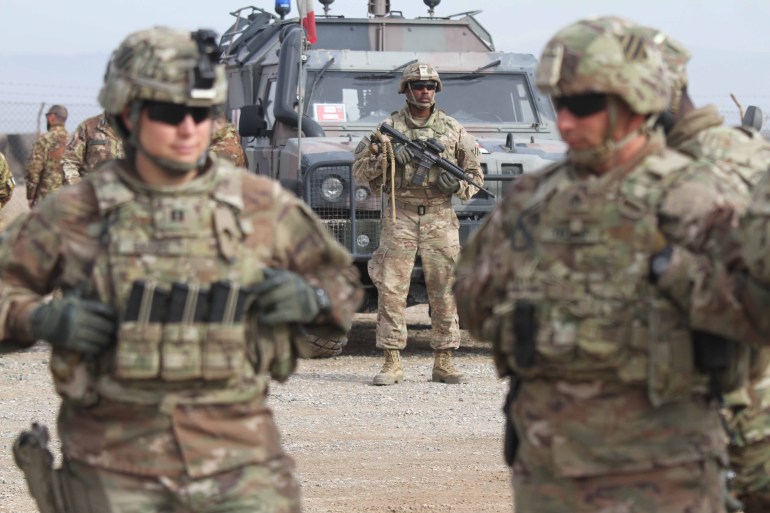What we know about the US troop withdrawal from Afghanistan
President Joe Biden announces a September 11 deadline for withdrawal of US troops on Wednesday.

United States President Joe Biden has announced plans to withdraw US troops from Afghanistan by September 11, ending the longest war in US history.
The date will mark twenty years since the September 11 attacks on the US, the event that precipitated the US-led invasion of Afghanistan and the following war, which toppled the Taliban’s five-year rule.
Keep reading
list of 4 itemsHow will US troop withdrawal affect Afghanistan?
Biden to withdraw US troops from Afghanistan by September 11
Full text: What does the Taliban-US agreement say?
The timeline adds months to the May 1 deadline reached in a deal between the administration of President Donald Trump and the Taliban, who still control large swaths of the country amid ongoing fighting with Afghan government forces. The agreement assured that Afghan soil would not be used to undermine the security of the US and its allies in exchange for the troop pullout, while leaving the domestic future of the country – and peace – to be largely negotiated by the Taliban and the Afghan government.
Biden had previously said it would be tough to meet that May 1 deadline, but that he did not foresee US troops staying in Afghanistan into 2022.
NATO says there are 2,500 US troops in the country but those numbers can fluctuate, and The Washington Post and the New York Times have reported there are approximately 1000 more than that, down from a 2011 high of over 100,000.
The US also offers air support, planning and support for the 7,000-strong NATO training mission, which also includes non-NATO-members Australia, New Zealand and Georgia.
Both the US and NATO officially ended combat operations in the country in 2014.
Here’s what we know so far about the planned withdrawal.
What has the administration said?
Biden said on Wednesday that “it is time for American troops to come home”, according to an excerpt of the speech.
“We cannot continue the cycle of extending or expanding our military presence in Afghanistan hoping to create the ideal conditions for our withdrawal, expecting a different result,” he said, while noting he is the fourth US president to contend with the nearly 20-year-long war.
“I will not pass this responsibility to a fifth,” he said.
A senior administration official told reporters on Monday that the decision comes after a “rigorous policy review” and that the only remaining US forces in the country would be those needed to protect diplomats.
The CIA director told the US Senate Intelligence Committee on Wednesday that the withdrawal will diminish Washington’s ability to collect and act on threats.
“There is a significant risk once the US military and the coalition militaries withdraw,” CIA Director William Burns said, although he said the United States would retain “a suite of capabilities”.
The withdrawal goes against pressure from the Pentagon to keep US forces in the country until Afghan security forces are able to take on the Taliban.
It is also a rejection of the so-called “conditions-based” approach that previous administrations had taken, meaning that the US would only withdraw its troops if certain conditions allowed.
“The President has judged that a conditions-based approach, which has been the approach of the past two decades, is a recipe for staying in Afghanistan forever,” the senior official said.
The Biden administration reportedly hopes that by setting a clear, albeit later, deadline, it could avoid a reprisal from the Taliban.
However, in the group’s first official statement since the plan was revealed, the Taliban reiterated its call for the withdrawal of all foreign forces on May 1, the date stipulated in the so-called Doha agreement with the Trump administration.
“The Islamic Emirate of Afghanistan seeks the withdrawal of all foreign forces from our homeland on the date specified in the Doha Agreement,” Taliban spokesman Zabihullah Mujahid wrote on Twitter.
“If the agreement is breached and foreign forces fail to exit the country on the specified date, problems will certainly be compounded and those who failed to comply with the agreement will be held responsible,” Mujahid added.
What does this mean for the Afghan government?
Biden spoke to Afghan President Ashraf Ghani Wednesday, before making the public announcement. Biden said that “the United States will continue to support the Afghan people, including through continued development, humanitarian, and security assistance,” according to a White House accounting of the call.
Ghani issued a series of tweets saying his country respects the withdrawal decision and will work with the US “to ensure a smooth transition” and said Afghanistan’s security forces “are fully capable of defending its people and its country”.
The former head of Afghanistan’s independent human rights commission, Sima Samar, has also called the decision to make the withdrawal unconditional “unfortunate” and said the pullout should be “conditional and responsible”.
The US intelligence community on Tuesday also voiced deep concerns over the outlook for the US-backed government in Kabul.

“The Afghan government will struggle to hold the Taliban at bay if the coalition withdraws support,” said the US assessment, which was sent to Congress.
“Kabul continues to face setbacks on the battlefield, and the Taliban is confident it can achieve military victory.”
The Biden administration has said it will shift its focus towards “supporting the ongoing peace process”.
That peace process, which has included talks between the Taliban and the Afghan government in Doha, has so far seen little progress amid an uptick in fighting between the Taliban and government forces.
Nearly 1,800 Afghan civilians were killed or wounded in the first three months of 2021 during fighting between government forces and Taliban insurgents despite efforts to find peace, the United Nations said on Wednesday.
Still, while the Taliban has said it would not take part in any summits until foreign forces had left the country, Turkey announced on Tuesday both the Taliban and the Afghan government would join a 10-day summit, along with the United Nations and Qatar, hosted by Ankara.
The meeting is meant to lay the groundwork for a “just and durable” political settlement, according to Turkey’s foreign ministry.
What does this mean for NATO forces?
Foreign and defence ministers from NATO countries were meeting on Wednesday in Brussels to discuss the US withdrawal. The US, UK, France and Germany were also set to hold a separate meeting afterwards.
Before those talks, US Secretary of State Antony Blinken said Washington would work with NATO allies for a “safe, deliberate and coordinated withdrawal of our forces from Afghanistan”.
“I am here to work closely with our allies, with the (NATO) secretary-general, on the principle that we have established from the start: In together, adapt together and out together,” he said.
Earlier on Wednesday, German Defence Minister Annegret Kramp-Karrenbauer said that, given the US timetable, a withdrawal by NATO forces in Afghanistan was likely in September.
“We always said: we’ll go in together, we’ll leave together,” she told ARD public television. “I am for an orderly withdrawal and that is why I assume that we (NATO) will agree to that today.”
Meanwhile, the Russian foreign ministry said on Wednesday that a US plan to withdraw troops from Afghanistan by September 11 violated the previous agreement to leave the country by May 1 and could lead to an escalation, the Interfax news agency reported.
What have US legislators said?
The withdrawal plan has largely split US legislators, with some arguing the plan will embolden the Taliban, lead to further instability, and backslide on human rights progress made in the country.
The Taliban, who enforce an austere brand of Sunni Islam, banned women from schools, offices, music and most of daily life during their 1996 to 2001 rule over much of Afghanistan. Two decades later, 40 percent of schoolchildren are girls.
Representative Mike McCaul, the top Republican on the House Foreign Affairs Committee, said the withdrawal means “abandoning our Afghan partners during critical peace negotiations and allowing the Taliban a total victory”.
Liz Cheney, the third-ranking Republican in the US House of Representatives, said in a statement: “Withdrawing our forces from Afghanistan by September 11 will only embolden the very jihadists who attacked our homeland on that day 20 years ago.”
I strongly support President Biden's commitment to withdraw all US forces from Afghanistan. It's time to bring our troops home. pic.twitter.com/Z35AQor0aq
— Elizabeth Warren (@SenWarren) April 13, 2021
Others legislators have applauded the plan, with progressive Senator Elizabeth Warren saying US involvement in the country had turned into a “vicious circle”.
US senators were set to receive a classified briefing on the plans on Wednesday, Senate Majority Leader Chuck Schumer said.